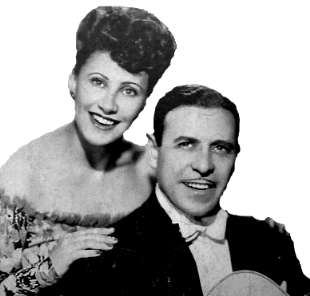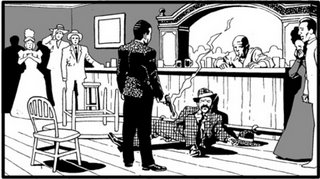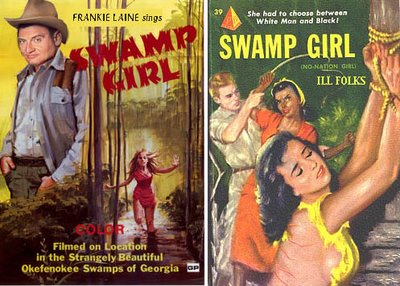
It's Anna Domino and Annie Herring.
And rather than do a Lawrence Welk impression by introducing "Anna one, Annie two," let's get the facts out of the way, fast. YOU may not have heard of either, but they have been in the music biz for 20 (Domino) and 30 (Herring) years now.
Herring is a Christian singer-songwriter, so chances are you'd know her if you feel more positive about Oral Roberts than oral sex. All her recordings are on Christian record labels, but don't label her a Jesus freak. Take the perky, pretty "Wild Child," from her very first album. It's faster than a pirouetting rodent and filled with the kind of free-wheeling glee that most will only get after an uplifting morning in church or an upshot of Summers' Eve.
Is it a sin to download this out of print bit of Herring? What would Jesus do?
Like many contemporary Christian singers Annie's lyrics are not always overt in referencing that Son of you-know-who. (Parenthetical note: the grand Rebecca St. James scored a massive contemporary Christian hit via "Me Without You," which SHE thought was about God. The songwriter, Martin Briley, was just writing a love song to a very real You. But the Lord moves in mysterious ways).
As sung very fast by A. Herring:
WILD CHILD I always wanted my life to look like the right side of a tapestry, a tapestry, But darkness was weaved in when I was conceived in iniquity. And now I wanna be cut free... You took me out of hell when you tore through my veil And now all I can do is just look at you And be me for the first time. I feel like a child that's never gone wild. And I feel pretty in my soul The darkness is gone And what keeps me hangin' on is you. And that's all I want..."
As for Anna Domino, she's had a cult following for twenty years, which means she can pretty much walk around unnoticed. Her real name is the less ecclesiastical Anna Taylor. Her style of indie-pop, at least on the cut you're about to hear, puts her somewhere into the Joni Mitchell category of someone cool, literate and aloof.
Born in Tokyo, raised in Ann Arbor, Michigan, she gravitated to Manhattan and worked with various indie rock bands, releasing her first full length album in 1986. "Own Kind" is from that vinyl.
She has since gone on to record some interesting stuff with her husband Michel Delory (check out Favourite Songs from the Twilight Years 1984-90). In 1999 the duo re-named themselves Snakefarm and released "Songs from My Funeral," filled with traditional folk songs and murder ballads.
OWN KIND Here we are polite well informed and mannerly All our boys and girls have money and enough to eat And weave a thread through the whole community Showing how we value heredity And what it means to belong to a fatherland Know the aborigine, colourfull but out of hand And now and then others come and threaten us And we fall back on forces we can trust And we shake our fists at the posters on the barroom wall We display our public grievance In the editorial page or else we paint it on a subway hall. We look upon the world but we're not quite part of it All the trouble there surely isn't our fault All the pain and hate and the needless punishment We've grown out of that and we're quite proud of it And something else that should well bear mentioning Once we were on top fashionable and interesting And we held sway over half this ship of fools Subject to our values myths and rules We know we can't afford to lose the past So full of moral lessons we thought would always last But now so many years without a war We have a generation A generation rotten to the core.
Instant song download ANNA DOMINO
Instant song download ANNIE HERRING




